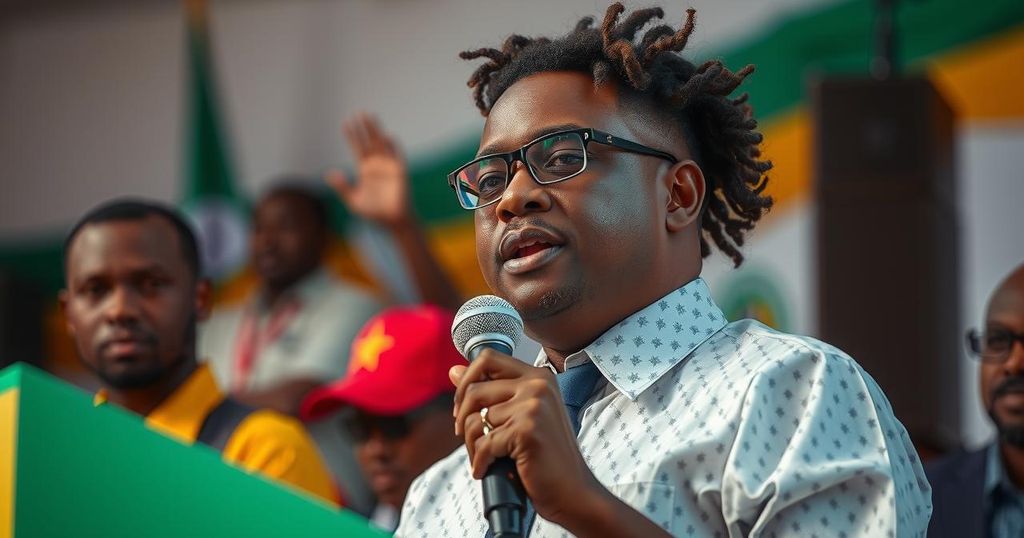Ghana’s Upcoming Elections: A Competitive Landscape Amid Economic Challenges

The upcoming December 7 elections in Ghana feature a competitive race between former President John Mahama and current Vice President Mahamudu Bawumia amid economic recovery challenges. Voter sentiment reveals a desire for new leadership due to dissatisfaction with long-standing party dominance. Key issues include economic conditions, infrastructure, and illegal mining.
The forthcoming national elections in Ghana, scheduled for December 7, are anticipated to be fiercely contested, with former President John Mahama poised as a significant challenger to ruling party candidate Mahamudu Bawumia. Mahama has committed to fostering a 24-hour business environment aimed at enhancing job opportunities whilst addressing an economy still recovering from a $30 billion external debt default reported in 2022. Meanwhile, Vice President Bawumia emphasizes his dedication to revamping the economy in the face of post-COVID challenges and other internal pressures.
The political landscape in Ghana has been dominated by two primary parties—the National Democratic Congress (NDC) and the New Patriotic Party (NPP)—since 1992. According to Kwame Asah Asante, a senior lecturer at the University of Ghana, the results from previous elections suggest that this trend is unlikely to shift significantly. Asante notes, “It’s the dominant parties; one of them is going to carry the day.” Minor parties have historically struggled to gain traction, and even if they exceed 4% of the vote, they might succeed in forcing a runoff.
In the capital city of Accra, billboards portraying the various candidates create a vibrant campaign atmosphere, eliciting excitement and engagement from voters. However, some voters express dissatisfaction with the longstanding dominance of the two primary parties. Angela Ofori, an undecided voter, remarked, “Since 1992 to this year, we haven’t changed parties … we want to change to a different party so that we would see more improvements.”
The electoral discourse is further enriched by the emergence of independent candidates, such as Nana Kwame Bediako, who aims to appeal to the youth with innovative visions, despite his lack of substantial influence on the overall election outcome. Bediako’s manifesto commits to environmentally sustainable policies that promote economic growth alongside ecological responsibility.
Ghana’s economic context remains precarious, as it grapples with external debt complications and the repercussions of the COVID-19 pandemic, exacerbated by global disruptions such as the war in Ukraine, which has impacted grain supplies significantly. Asante indicated that voters are focusing predominantly on economic conditions, emphasizing that “the economy will play an important role because it’s a bread-and-butter issue.” Taden echoed this sentiment, noting, “inflation at some point was at a historic 54% over the last 18 months.” These economic challenges, coupled with the issue of illegal mining, are pivotal in shaping voter sentiment, with many voters aligning their hopes for change with Mahama’s promises.
Conversely, some constituents express confidence in Vice President Bawumia’s governance, crediting him with significant innovations through his digitization initiatives. NPP supporter Ivan Duke praised the policy for its potential to create jobs and enhance accessibility, asserting that “this policy is about creating jobs online.” Additionally, Taden suggested that Bawumia has delivered effectively on many of his commitments aimed at improving governmental operations through digitization.
In conclusion, Ghana’s forthcoming elections are set against a backdrop of economic recovery efforts, entrenched party dynamics, and the emergence of new political alternatives. While the primary contest remains between the NDC and NPP, the growing insistence on economic reform and voter demand for change could influence the electoral outcome. The elections represent an opportunity for Ghanaians to voice their aspirations for a more prosperous and equitable future.
Ghana’s election stands as a testament to the country’s political stability amid a tumultuous regional landscape. The nation has been governed by two main political parties since the early 1990s. With economic conditions deteriorating due to past borrowing and global challenges such as the COVID-19 pandemic, the electorate is looking for viable solutions to immediate problems, particularly regarding unemployment and infrastructure development. Additionally, issues of illegal mining are also causing environmental concerns alongside economic challenges, thus shaping the voters’ priorities heading into the election.
The imminent national elections in Ghana reflect a crucial moment in the country’s democratic expression, as citizens evaluate their options amid pressing economic challenges and political competition. The choices presented by candidates Mahama and Bawumia underscore divergent visions for the nation’s future. As the election date approaches, the interplay between traditional party loyalties and the demand for new approaches may well redefine Ghana’s political landscape in years to come.
Original Source: www.voanews.com





